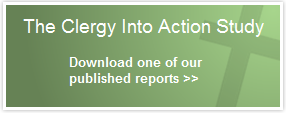Psychologists’ research on emotional intelligence (EQ) has helped point out the importance of emotional awareness and mastery in how people function in their work, relationships, and lives. Daniel Goleman’s and Richard Boyatzis’s and Annie McKee’s work on EQ has shown how emotional intelligence is crucial for effective leadership.
Part of emotional intelligence is awareness of how you respond emotionally and how you handle the emotions that come up in yourself and others. Are you more emotionally controlled, or more wide-ranging and variable in your emotional responses? People form dispositions, or consistent ways-of being, in relation to how they approach emotions. Each of these approaches to emotions has benefits—and each can result in problems as well.
The Temperament Comparator (TC) shows people’s dispositional leaning toward emotional control or emotional responsiveness. Like the general U.S. population of workers and professionals, recently ordained pastors and priests from across denominations vary widely in emotional control-to-responsiveness—but a higher percentage show a dispositional preference toward emotional control.
People with lower scores on Emotional Responsiveness are calmer, more even-tempered, stable, and deliberate. More emotionally controlled leaders can be particularly helpful in high-stress situations; but, they are also not likely to generate enthusiasm and energy, and might not be as aware of or responsive to the feelings of others. At the other end of the spectrum, people scoring high on Emotional Responsiveness are charismatic, intense, and expressive of a wide range of emotions. Leaders who are more emotionally responsive are helpful in attracting and drawing people, and in sensitivity to others’ emotions; but (like the little girl with the little curl in the old nursery rhyme) when they are good, they are very, very good—and when they are bad, they are horrid.
On average, clergy are near the center of the continuum of Emotional Control-to-Responsiveness. They are less emotionally responsive than sales workers, and are more similar to professional workers and manager in their emotional responsiveness. More recently ordained pastors and priests, like professional workers, gravitate a bit toward emotional control.
Like other leaders, clergy are not always aware of the strengths and limitations of their disposition toward emotional control or responsiveness—or of the impact they have because of how they handle emotions. Emotions are a gift when understood and handled wisely. Emotional control or reservation is a helpful gift as well when used appropriately. But constantly emoting in the name of “honesty” or consistently suppressing emotion for the sake of restraining “base instincts” will lead to personal dissatisfaction and, more profoundly, will generate frustration and distrust among members of one’s community of faith.
Self-awareness and awareness of others are fundamental to healthy integration of emotion in the life of ministry and leadership. Doing the soulful work of becoming more emotionally aware, attuned, and adept will have benefits for clergy at all levels and ages of ordained ministry. Such soulful work can occur through working with family systems theory and therapy, emotional intelligence, mindfulness forms of meditation and contemplative prayer, and spiritual direction.
Related Articles




